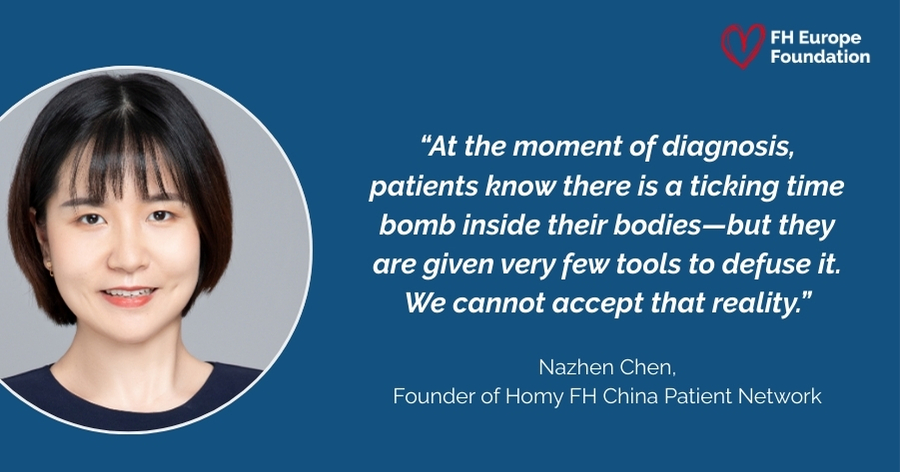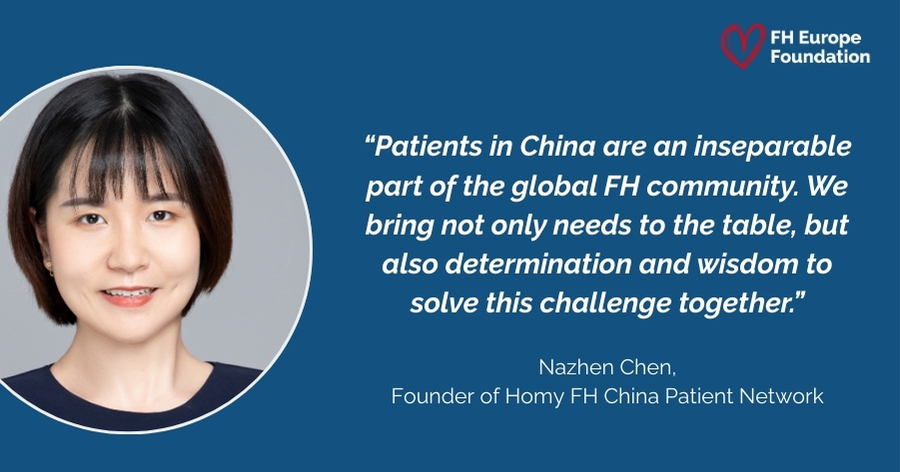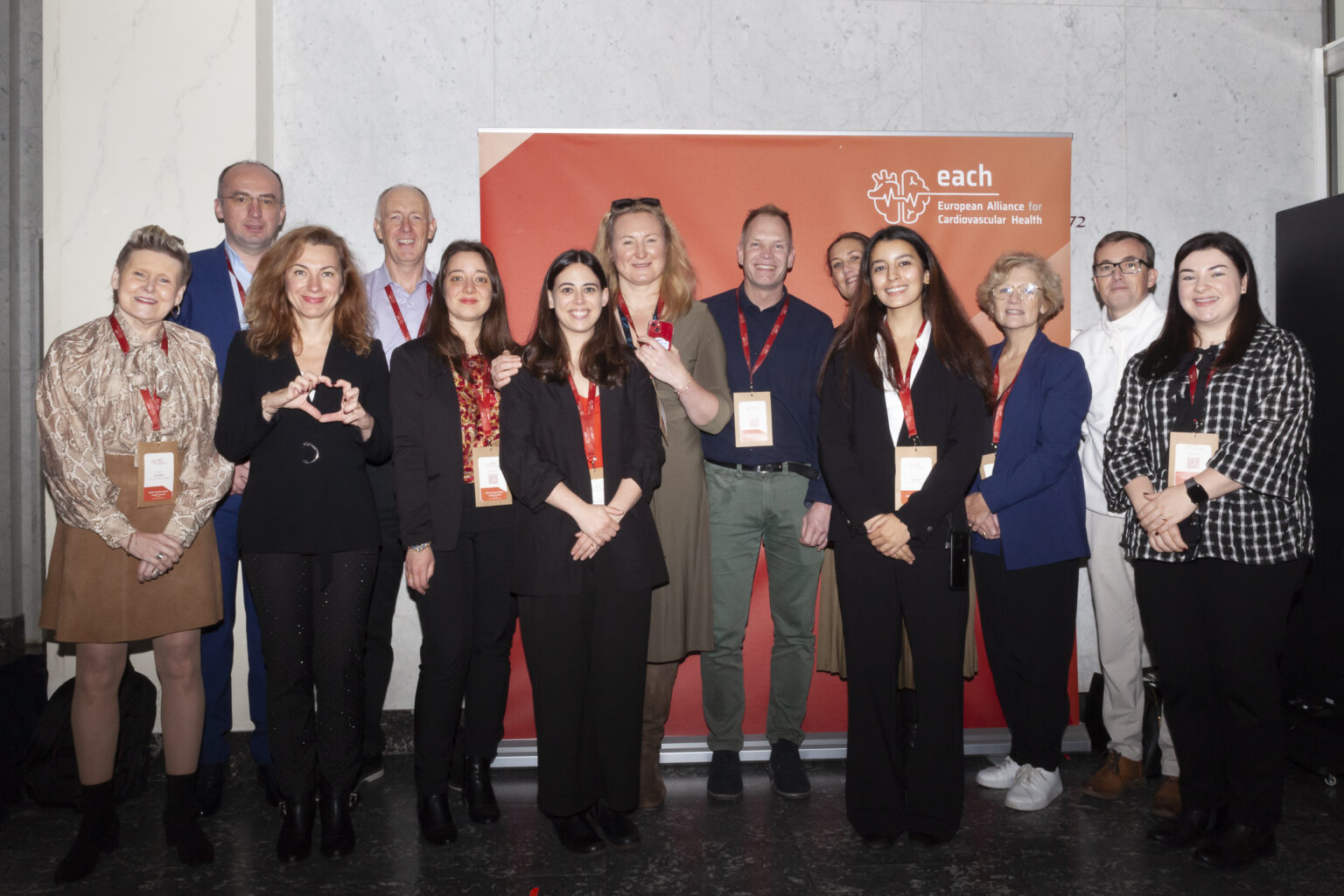The FH Europe Foundation is delighted to welcome FH China as new member of our international Network. This partnership marks a significant step in amplifying patient voices, strengthening global collaboration, and accelerating progress for communities affected by familial hypercholesterolaemia (FH) and related conditions.
Founded by Nazhen “Jenna” Chen, a heterozygous FH patient with family members living with the condition, FH China has rapidly grown into a national force for patient advocacy, scientific engagement, and awareness. Key achievements include:
As one of the few patient-centred FH organisations in East Asia actively shaping the national dialogue on genetic lipid conditions, FH China brings unique perspectives, determination, and cultural insight to the global movement.

FH China’s connection with the FH Europe Network began even before formal membership. They participated in the 2024 Annual Network Meeting in Vienna and the 2025 Meeting in Zagreb, where Jenna presented on FH China’s work, challenges, and aspirations. These engagements cemented the alignment between FH China’s mission and FH Europe’s values, emphasising the importance of international collaboration in research, policy, and patient engagement.
Through the Network, FH China aims to:
Their membership brings fresh energy to the Network, enhancing diversity, cultural insight, and research collaboration. With links to clinicians like Dr. Chu, opportunities emerge for joint workshops, knowledge exchange, and bridging global research efforts, particularly in HoFH and emerging Lp(a) therapies. Their work on Mandarin-language awareness tools and localisation of FH Europe resources will make the Network more globally relevant and inclusive.
As part of the FH Europe Foundation, FH China will benefit from shared expertise across more than 30 patient organisations, including high-level policy guidance, participation in international advocacy initiatives, support for communication campaigns, and mentorship from organisations that have successfully influenced national FH policies.
Looking ahead, 2026 promises meaningful collaborations, including:
Together, we are building a global environment where people affected by inherited lipid conditions—no matter where they live—are supported, understood, and able to access the care they deserve.
We are proud to welcome FH China into the FH Europe Foundation Network. Their leadership, passion, and commitment will enrich our international community, and we look forward to many years of collaboration, learning, and impactful advocacy together.

Prepared by
 Elsie (Cindy) Evans,
Elsie (Cindy) Evans,
FH Europe Foundation Ambassador Programme Manager
December marked a milestone moment for FH Europe Foundation, closing an exceptional year of advocacy, collaboration and policy impact with the adoption of the European Safe Hearts Plan. From major EU-level developments to global engagement, patient leadership and research recognition, the month reinforced a shared commitment to prevention, early diagnosis and patient-centred cardiovascular care as the community looks ahead to 2026.
Catch up on the key highlights from the December 2025 edition of the Heart Beat newsletter:
On 16 December 2025, the European Commission published the first-ever EU Cardiovascular Health Plan, the Safe Hearts Plan, setting out a comprehensive and long-awaited European response to the leading cause of death and disability across the Union.
The FH Europe Foundation (FHEF), the European Atherosclerosis Society (EAS), and the Lp(a) International Task Force (Lp(a) ITF) warmly welcome this landmark initiative and commend the European Commission for placing cardiovascular health firmly at the centre of Europe’s public health, social and economic agenda.
Cardiovascular diseases affect around 62 million people in the EU, claim 1.7 million lives every year, and cost the European economy an estimated €282 billion annually¹. Without decisive action, the burden of cardiovascular disease is projected to rise by 90% by 2050, despite the fact that up to 80% of cardiovascular disease is preventable1,2.
“The Safe Hearts Plan clearly recognises that the most effective cardiovascular medicine is prevention. By embedding personalised, life-course approaches and addressing inherited risk, Europe now has a real opportunity to prevent disease before it starts, rather than treating its consequences decades later.” - Prof. Børge Nordestgaard, President, European Atherosclerosis Society.
The Safe Hearts Plan sends a clear and timely signal: Europe must move away from late intervention and crisis care, towards personalised, preventive, predictive, participatory and life-course approaches to cardiovascular health. By setting ambitious targets for 2035, including a 25% reduction in premature cardiovascular deaths, and by strengthening EU-wide collaboration on prevention, early detection, treatment and care, and quality of life, the Plan establishes a strong framework to protect both current and future generations3. This also means that the widespread practice of only conducting a first complete lipid and cardiovascular health profile at the age of 40+ should be abandoned, as this results in lost decades of prevention opportunities that can no longer be recouped.
Crucially, the Plan recognises that prevention cannot be “one-size-fits-all”. By integrating personalised prevention, supported by data, digital tools and artificial intelligence, it creates the conditions for more precise risk prediction, earlier intervention and more effective use of health system resources.
FHEF, EAS and Lp(a) ITF particularly welcome the Plan’s explicit recognition that cardiovascular risk is not only driven by lifestyle factors, but can also be genetic, lifelong, and present from birth.
Inherited lipid disorders affect an estimated 90 million people in the EU. Familial hypercholesterolaemia (FH) affects around 1 in 250-300 individuals, corresponding to approximately 2 million adults and 500,000 children, while elevated lipoprotein(a) [Lp(a)] affects around 1 in 5 people3.5. These conditions remain severely underdiagnosed and are major drivers of premature heart attacks, strokes, and aortic valve disease.
By explicitly acknowledging FH and elevated Lp(a), the Safe Hearts Plan marks a major step forward for families affected by inherited lipid disorders and reinforces the need to integrate genetic and lifelong risk into cardiovascular prevention strategies.
Importantly, the Plan also references EU-funded initiatives such as PERFECTO FH and FH-EARLY, underlining the importance of evidence-based, life-course prevention, universal paediatric screening for FH, social and behavioural science, personalised communication models, innovation in genetic testing and diagnostics, and the responsible deployment of digital and AI-enabled tools within trusted clinical pathways6,7.
The proposed EU Protocol on Health Checks for Cardiovascular Diseases is one of the most strategic elements of the Safe Hearts Plan and a key enabler of personalised prevention.
The priorities set out in the Safe Hearts Plan are strongly aligned with the work of the three organisations, which have long called for systematic, at least once-in-a-lifetime testing of lipoprotein(a) as part of comprehensive cardiovascular risk assessment. “This alignment reinforces the scientific consensus that early identification of elevated Lp(a) is a cornerstone of personalised cardiovascular prevention and should be done in context with the other common risk factors such as high LDL cholesterol, hypertension, obesity, diabetes and family history in the sense of a global cardiovascular risk assessment.” – Prof. Florian Kronenberg, Chair of the Lp(a) ITF.
EAS, Lp(a) ITF, and FHEF strongly believe that this protocol offers a major opportunity to prevent the vast majority of avoidable cardiovascular events, provided it fully capitalises on the Commission’s prevention-first and life-course vision. Health checks must move beyond adult-only approaches, identify risk before disease, and support timely, tailored interventions based on individual and familial risk profiles.
If Europe is serious about preventing up to 80% of avoidable cardiovascular disease, prevention—and therefore screening—must begin in childhood, while being combined with adult testing to deliver rapid and sustained population-level impact.
Early-life screening is the only effective way to detect familial hypercholesterolaemia and elevated Lp(a) in time to prevent decades of cumulative arterial damage5,8. It also enables the early identification of rare but life-threatening conditions, such as homozygous FH (HoFH) and familial chylomicronaemia syndrome (FCS), and supports family-based cascade and reverse-cascade testing, protecting entire families across generations.
“Heart disease as a result of undiagnosed FH changed my family’s life. The risk was detected simply too late. The Safe Hearts Plan gives future families something we didn’t have—the chance to know early, act early, and prevent avoidable heart attacks and strokes.” Lena Rosa Hanauer, FHchol Austria, FHEF Youth Group Ambassador and Secretary of the FHEF Patient Council.
Early screening further allows for the identification of related conditions, including type 1 diabetes (T1D), which has a similar prevalence to FH, within a holistic cardiometabolic framework. Most importantly, it creates a window of opportunity to support healthy behaviours from childhood, fully aligned with the Commission’s ambition to give European children and families truly safe hearts and so much more.
Decades of scientific evidence, clinical guidelines, and health-economic studies demonstrate that paediatric lipid screening is effective, timely and cost-saving, with a proven return on investment9,10. It is already recognised as an EU Best Practice and is reflected in the Prague Declaration on FH, the Brussels International Declaration on Lp(a) Testing and Management, and European clinical guidelines4,5,11.
In line with the Safe Hearts Plan, and building on the Commission’s vision for personalised prevention, EAS, Lp(a) ITF, and FHEF stand ready to support the development of an EU Protocol on Cardiovascular Health Checks that integrates early-life screening into a coherent life-course approach.
Such a protocol should include systematic lipid screening for children in the first decade of life, integrated into existing child health and vaccination programmes; measurement of a full lipid profile including LDL cholesterol, Lp(a) and triglycerides; family-based cascade and reverse-cascade testing; and seamless integration with adult cardiometabolic health checks.
Digital tools and artificial intelligence, aligned with the European Health Data Space, should be used to support risk prediction and personalised prevention, while ensuring transparency, explainability and clinician-mediated decision-making, in line with patient trust and ethical standards.
This approach is fully aligned with findings from Commission co-funded projects, including PERFECTO FH and FH-EARLY, and supports the Plan’s objectives to reduce inequalities, improve outcomes and strengthen health system sustainability.
The Safe Hearts Plan is part of a broader EU health policy package aimed at making Europe’s health sector more innovative, competitive, and resilient, alongside the proposed Biotech Act and the revision of the Medical Devices framework.
Together, these initiatives signal a clear strategic direction: accelerating innovation in prevention, diagnostics and treatment; enabling the responsible use of AI and data; strengthening European research and industry; and ensuring that patients across the EU benefit earlier and more equitably from scientific progress.
The Safe Hearts Plan creates a unique window of opportunity. Its success will depend on ambitious implementation by Member States, supported by EU coordination, funding, research and innovation.
FHEF, EAS, and Lp(a) ITF stand ready to work hand in hand with the European Commission, European Parliament, Council of the European Union, Member States, clinicians, scientists and people with lived experience to ensure that prevention truly starts early, health checks deliver maximum population impact, and no child or family is left behind due to late diagnosis.
“This Plan represents a turning point not only because it exists, but because of how it can be implemented. By embedding early detection, personalised prevention and co-creation with scientists, healthcare professionals, and equally with patients and citizens, Europe can translate innovation into real-world impact and prevent avoidable cardiovascular disease at scale.” Magdalena Daccord, CEO, FHEF.
By acting early, Europe can deliver on the promise at the heart of the Plan: safe hearts, healthier lives and a more resilient future.
Prepared by
 Magdalena Daccord,
Magdalena Daccord,
FH Europe Foundation Chief Executive Officer
References
The European Alliance for Cardiovascular Health (EACH) Summit, held in Brussels on December 11 to 12, brought together policymakers, clinicians, researchers, patient leaders, industry stakeholders, and life sciences representatives for two days of strategic dialogue aimed at accelerating progress against Europe’s leading cause of mortality: cardiovascular disease (CVD). The purpose of the Summit was clear: mobilise actionable momentum around the forthcoming EU Cardiovascular Health Plan, create alignment across sectors, and highlight the critical role of patient experience, innovation, and cross-domain collaboration in shaping a more resilient and equitable cardiovascular future. From prevention and early detection to health system redesign, the Summit served as a platform for collective commitment and concrete solutions.
A Programme Addressing the Urgent and the Essential
Across two days, the Summit covered a wide spectrum of priority themes, reflecting the complexity of cardiovascular health. High-level political leadership—including the European Commissioner for Health, Olivér Várhelyi and Members of the European Parliament—underscored the growing political will to tackle CVD at scale. Scientific sessions addressed environmental impacts on cardiovascular risk, mental health interactions, gender differences, and country-level examples such as Denmark’s national approach to CVD. Panel discussions explored inequalities, equity-oriented national action plans, and the competitiveness implications of cardiovascular health investment.
Day 2 deepened the focus on innovation, patient partnership, and system integration. The session Bridging the Innovation Gap emphasised the importance of co-creation with patients actively shaping, rather than passively validating, the design and implementation of health innovations. This set the stage for a robust discussion on patient leadership, followed by a cross-domain session exploring synergies, learnings and opportunities between Beating Cancer Plan and the upcoming cardiovascular health Plan.
FH Europe Foundation’s Contributions: Elevating Patient Voice and Multistakeholder Dialogue
FH Europe Foundation (FHEF) played a significant role in shaping the Summit’s narrative and content. FHEF organised the session CVD and Cancer: Synergies, Learnings, Opportunities, and Challenges, moderated by Dr. Marius Geanta. Bringing together Penilla Gunther (EU Cancer Mission Board Member), Dr. Françoise Meunier (European Initiative on Ending Discrimination Against Cancer Survivors) and Dr. Catherine Paradis (WHO Regional Office for Europe), the panel established that meaningful progress in CVD can be accelerated by applying mature models from the cancer field, including coordinated care structures, survivorship frameworks, and strong patient advocacy ecosystems. This message resonated strongly across the Summit. The session demonstrated how closely aligned Europe’s cancer and cardiovascular agendas already are—and how much faster progress can be made by learning across them.

Drawing on the EU Cancer Mission, Penilla Gunther highlighted highly transferable insights on governance, clear goal-setting, and mission-oriented approaches, powerfully illustrating the untapped potential for a similar ambition in cardiovascular health. Catherine Paradis grounded the discussion in robust evidence, underscoring the role of commercial determinants of health and prevention policy levers, notably the shared impact of alcohol on both cancer and CVD and the practical relevance of WHO “best buys,” including the 3A approach.
Françoise Meunier brought a deeply human-centred perspective, emphasising survivorship, long-term outcomes, tobacco control, and the fundamental importance of the Right to Be Forgotten, arguing convincingly that these must be embedded as core pillars of health systems across disease areas. Together, the discussion reinforced that the forthcoming EU Cardiovascular Health (Safe Hearts) Plan can build decisively on existing cancer frameworks—without reinventing the wheel.
The recording of the session is available here.
FHEF’s commitment to embedding lived experience in policy conversations was also evident through Marc Rijken’s (FHEF Patient Ambassador and Member of the Lp(a) International Taskforce) participation in the Patient Voices in Action panel. Marc joined patient advocates living with diabetes, and cardiomyopathy and a stroke survivor, to present a compelling case for integrating patient experience into the very architecture of the EU Cardiovascular Health Plan. His testimony—highlighting how patient journeys can expose failures in system coordination, information flow, and multidisciplinary collaboration—reinforced the urgency of designing systems that work for real people navigating complex conditions.

Spotlight on PERFECTO: A Case Study in Applying Cross-Domain Best Practice
A highlight of the Summit was the reference to PERFECTO project, focused on improving the diagnostic and care pathways for individuals with inherited lipid disorders. PERFECTO embodies the Summit’s key message: progress comes from applying existing best practices rather than continually reinventing frameworks. The project draws on methods long established in cancer, including systematic screening, multidisciplinary management, and structured patient engagement, to address gaps in the lipid disorders pathway. Its inclusion at the Summit illustrated how cross-domain learning can translate into tangible system gains for cardiovascular care. This exemplifies an approach increasingly recognised as indispensable: identify proven models, adapt them to cardiovascular contexts, and scale them across Europe.
A Moment of Real Policy Momentum: Toward the EU “Safe Hearts” Plan
Held a week ahead of the EU CV Health Plan announcement, the event struck a powerful note that underscored the importance of political engagement. In his keynote address, European Commissioner for Health Olivér Várhelyi introduced the plan’s official name—Safe Hearts—and provided a first look at several of its anticipated priorities before its adoption on 16 December. The Plan will focus on scaling prevention and early detection, introducing cardiovascular health checks across all Member States, strengthening tobacco and nicotine products regulation, investing in AI-driven risk prediction, addressing gender-specific risk gaps, and improving outcomes for future generations.

This political commitment was reinforced by strong engagement from Members of the European Parliament, national government representatives, and international organisations throughout the programme. Their contributions reflected a growing consensus: cardiovascular health requires a unified, long-term EU strategy rooted in prevention, innovation, patient experience, and cross-disciplinary collaboration.
With this Summit, the cardiovascular community demonstrated readiness not only to support but to shape the implementation of the Safe Hearts Plan. The conversations made one thing unmistakably clear: Europe stands at a pivotal moment. By aligning existing best practices, elevating patient voices, and embracing cross-sector collaboration, Europe has the opportunity to usher in a transformative new era for cardiovascular health, one that finally matches the scale of the challenge.
Watch the highlights here: https://www.youtube.com/watch?v=QBgLrRC-m4I

Prepared by
 Dr. Marina Leroy,
Dr. Marina Leroy,
FH Europe Foundation Scientific Communications Manager